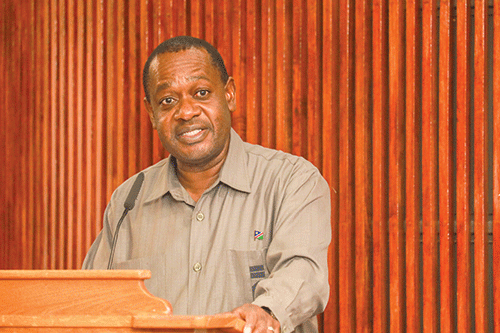Lahja Nashuuta
Information minister Peya Mushelenga said, of the over two million SIM cards that are currently active in Namibia, only half of them are registered, following an extension on the grace period earlier this year.
“As of today, 26 January 2024, we have 2 387 777 active SIM cards, unfortunately only 1 694 744 have been registered (70.97%). I must clearly state that a grace period cannot further be extended. The date of 31st March 2024 is final,” the minister said, urging all citizens to go and register their SIM cards, as there will not be any further extension.
Addressing the staff members of his ministry at the annual staff meeting in Windhoek on Friday, Mushelenga maintained that the SIM card registrations came about as a government directive following the establishment of the National Cyber Security Incident Response Team (CSIRT), which was a critical step in the State’s proactive response to cyber threats.
The policy, he said, was adopted by the government to mitigate security concerns, address crime, and enable the application of digital services, and by 31 December 2023, all SIM cards should have been registered.
The minister further revealed that the government has expanded the national fibre-optic backbone, resulting in faster and more reliable internet connectivity, which has been critical in closing the digital divide.
However, according to Mushelenga, improvements in technology have not come without challenges, and in 2022 alone, Namibia recorded over 2.7 million cyberattacks.
“Hackers steal people’s data and use it for their benefit. They further damage the reputations of institutions that they attack. We have since paid attention to cybersecurity architecture by developing solid systems and protocols to protect our digital assets and personal data,” Mushelenga said.
Digital future
The minister told his staff that this year, the ministry remains hellbent on creating a conducive environment through policies, starting with the finalisation of the National Digital Strategy and introduction of the Access to Information regulations and the Data Protection Bill. He further expressed hope that consultations on the cybercrime bill will be concluded and that the consolidated National ICT Policy will be finalised.
“The essence of our National Digital Strategy lies in its vision and mission, which articulates the dream for Namibia’s digital transformation. The strategy delves deeper into understanding our transformation into a society that is not only digitally literate but also innovative and inclusive. Central to this transformative journey are strategically chosen pillars, critical in maximising impact and fostering comprehensive digital development across Namibia’s various sectors and geographical landscapes,” he said.
According to Mushelenga, access to information will become more meaningful if data costs remain affordable, as such, the government is exploring the possibility of satellite connection positively impacting broadcasting, data, and voice services.
“In the meantime, the government will continue to roll out terrestrial networks to areas that are most out of reach. Going forward, we intend to mandate that no Radio Access Network site is shorter than 60 metres [which] will promote infrastructure co-sharing and reduce the number of sites within a location,” he said.
He revealed that the agreement between Namibia and Botswana that will ensure significant relief for data roaming between the two countries will kick in on 1 April.
– lnashuuta@gmail.com


